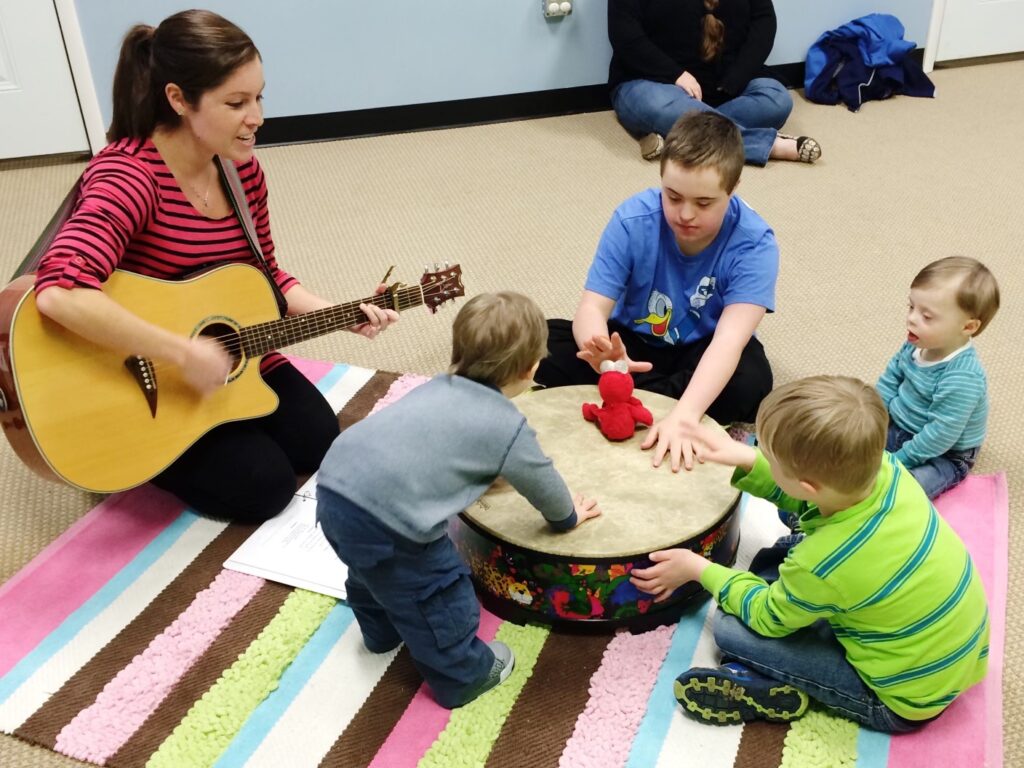
I’ve known from an early age how powerful music can be. It can stir emotions, evoke memories, and bring people together—it’s often referred to as a “universal language”. Music was so important to me that I majored in it during college, and it was during my sophomore year that a professor introduced me to the field of music therapy.
I’ve been a board-certified music therapist for 16 years now, and I’ve seen first-hand how this modality can enhance people’s lives in numerous ways. Let’s dive in and explore what music therapy is really about, and how it might even work for you.
Introduction to Music Therapy
Here’s a bit of a formal definition as a jumping off point: music therapy is a well-established and evidence-based allied health profession that uses music interventions to achieve therapeutic goals. It is provided by trained and certified music therapists who work with individuals to address physical, emotional, cognitive, and social needs. Music therapists use the power of music to help clients improve their overall well-being.
We have a diverse toolkit that includes musical instruments, vocalization, rhythm, and more. Our approach is tailored to each individual’s unique needs and preferences. For example, a child with autism might benefit from drumming and rhythmic activities, while we may engage a stroke survivor in singing familiar songs to aid in speech recovery.
Underpinning the art of music therapy is a strong foundation of science. Music therapy isn’t solely a subjective or anecdotal endeavor; it has a solid scientific basis. Music can incite the release of endorphins, mitigate the stress hormone cortisol, and augment memory and cognitive function.

Who Can Benefit from Music Therapy?
Music therapy is a versatile and effective therapeutic approach that can benefit a wide range of populations and be applied in various settings. Here’s a list of some of the populations for whom music therapy can be particularly effective:
- Children with Developmental Disorders: Music therapy can aid children with autism, Down syndrome, and other developmental disorders in developing social, communication, and motor skills.
- Seniors with Dementia: Music therapy is effective in improving the quality of life for seniors with Alzheimer’s disease and other forms of dementia. It can stimulate memories and emotional connections.
- Individuals with Substance Use Disorders: Music therapy can be integrated into addiction treatment programs to help individuals express their feelings, reduce cravings, and build coping skills.
- People with Physical Disabilities: Music therapy is used to enhance physical rehabilitation and motor skills development in individuals with physical disabilities, such as those recovering from a stroke or a traumatic brain injury.
- Children with Learning Disabilities: Music therapy can support children with learning disabilities like dyslexia and attention deficit hyperactivity disorder (ADHD) by enhancing focus, concentration, and learning.
- Hospice and Palliative Care Patients: Music therapy offers comfort and emotional support to individuals in the final stages of life. It can ease pain and promote relaxation.
- Veterans with PTSD: Music therapy is used to help veterans cope with post-traumatic stress disorder (PTSD) by providing a non-verbal outlet for processing trauma.
- Children in Pediatric Hospitals: Music therapy can provide distraction and comfort to children facing medical procedures, reducing anxiety and pain perception.
- Cancer Patients: Music therapy complements cancer treatments by alleviating symptoms like pain, nausea, and anxiety, and improving the overall emotional well-being of patients.
- Individuals with Mental Health Challenges: Music therapy is beneficial for those dealing with depression, anxiety, bipolar disorder, schizophrenia, and other mental health conditions. It provides a creative outlet for emotional expression and stress reduction.

The Therapeutic Power of Music
As a mental health counselor, I love incorporating music therapy strategies when they are a good fit for my clients. Music has a unique ability to reach deep within our souls, resonating with our emotions and thoughts. It can uplift us, calm our fears, and inspire hope. But how does this translate into therapeutic benefits for mental health?
- Emotional Release: Music provides a safe and non-verbal means of expressing emotions. When words fail us, music steps in, offering a channel for the release of pent-up feelings. For those struggling with depression, anxiety, or trauma, this can be a transformative experience.
- Stress Reduction: The soothing rhythms and melodies of music have a remarkable capacity to reduce stress and anxiety. When we immerse ourselves in harmonious sounds, our bodies respond by lowering stress hormones, such as cortisol, and releasing endorphins, nature’s mood lifters.
- Enhanced Communication: For individuals with conditions like autism or communication disorders, music therapy can be a bridge to better express themselves. Music offers a way to communicate and connect with others, enhancing their social and emotional well-being.
- Cognitive Function: Music therapy can stimulate cognitive function and memory recall. This is particularly valuable for individuals dealing with cognitive decline or disorders like Alzheimer’s disease. Through music, they can regain access to cherished memories and experiences.
- Motivation and Positive Change: Music has the power to inspire and motivate. It can encourage individuals to embrace positive change, improve self-esteem, and embark on a journey of personal growth.
Whether you’re seeking a path to better mental health, a channel for emotional expression, or a means of personal growth, music therapy can play an important role on your journey. If you’re interested in learning more about how it could help, please don’t hesitate to reach out. Music therapy services are available both in-person (central Illinois) and virtually (nationwide).
With respect and encouragement,

Ready to reach out? Schedule a free 15-minute consultation call.

